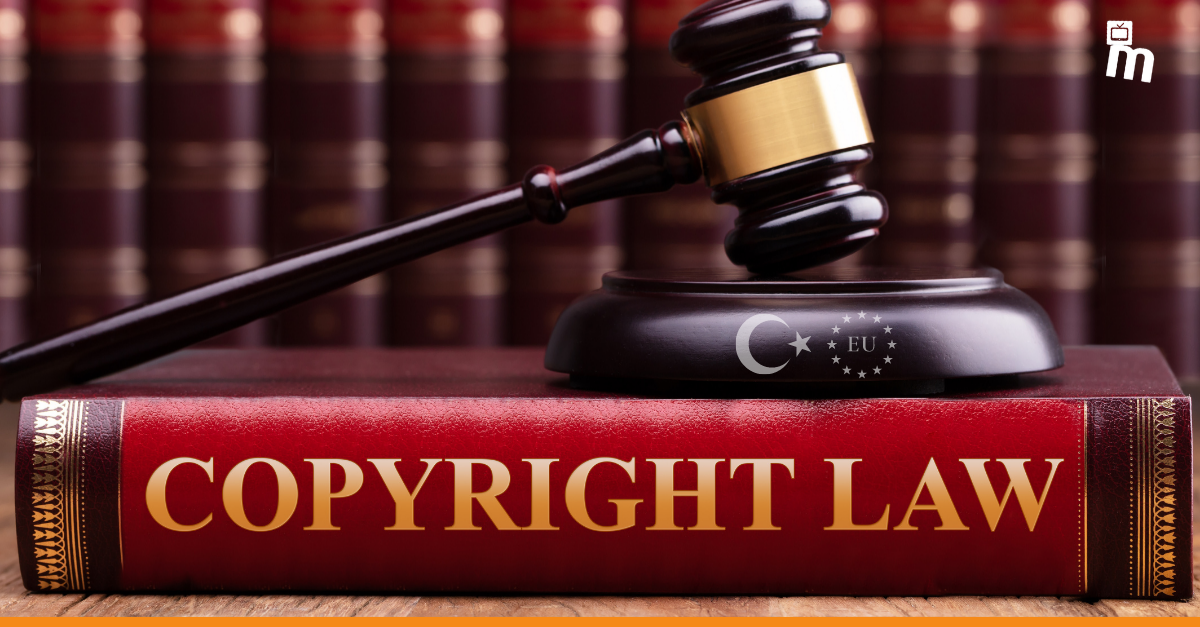What are the main differences between the EU and Turkish law copyright holders must consider before taking action? While right owners do not need to register their copyright to safeguard themselves, the EU and Turkish law do have different levels of protection.
1. What types of works are protected by “copyright”?
In the EU; literary, scientific and artistic works are protected by copyright.[1]
In Turkey; literary and scientific works, musical works, works of fine arts and cinematographic works are protected by copyright.[2]
2. Do I need to register my copyright?
Neither the EU nor Turkey requires registration of the copyright.
3. Which rights do the owner of the copyright have?
In the EU, the owner of the copyright has the right to reproduce and distribute the copyrighted work, as well as the right of communication of copyrighted work to the public, and making it available to the public.[3] The performers and broadcasting organisations have also the right of fixation while authors, performers, producers of phonograms and films have the right of rental and/or lending.[4]
In Turkey, owner of the copyright has the right to adapt, reproduce, perform, and distribute the copyrighted work, as well as the right of communication of copyrighted work to the public.[5]
Moral rights are also protected both in the EU and Turkey. However, moral rights are not harmonised at the EU level.
4. Is there a limitation period for copyright infringement actions?
Each member state in the EU has a different limitation period. The owner of the copyright must consider the laws of the member state they intend to take legal action in.
In Turkey, the owner of the copyright has a 2-year-period to take legal action after learning about the infringement and the identity of the infringer. In any event, the owner has a 10-year-period to take legal action after the infringement.[6]
5. Who can sue against copyright infringement?
In the EU, the rights owner can sue the infringer. However, member states may have different legislation regarding the non-exclusive licensee’s right to sue.
In Turkey, all rights owners (including licensee(s)) can sue the infringer to protect their economic rights.[7] However, according to Turkish jurisprudence, only the creator of the copyrighted work can sue the infringer if there is an infringement of moral rights.[8]
6. Who can be sued for copyright infringement?
In the EU, direct infringers of the above-mentioned rights can be sued yet intermediaries such as information societies can be exempt from liability under certain circumstances.[9] It must be noted that there is no harmonisation at the EU level regarding secondary infringement. On the other hand, rather than directly excluding some information societies from liability, the EU courts usually consider how these behave, and thus, unlike in Turkey, they may be held responsible.[10]
In Turkey, direct infringers of the above-mentioned rights can be sued.[11] In terms of secondary infringement; content and access providers may be held responsible.[12] However, hosting and mass-use providers are not responsible for controlling the content they include in their service.[13]
7. What remedies are available against copyright infringement?
In the EU, the rights owner can request corrective and preventative measures from the court, publication of judicial decision against the infringer, and claim damages (The type of damages -whether statutory, actual or loss of profits- varies for each member state.).[14]
In Turkey, the rights owner may claim compensation of up to three times the amount that could have been demanded if the infringed right had been granted by contract.[15] Alternatively, the rights owner may choose to claim damages.[16] If the infringer’s monetary gain arising out of the infringement is higher than the rights owner’s damages, the rights owner may claim the infringer’s profit. There are also remedies available to prevent further infringements
[17] and cease the infringement of a moral right.[18]
[1] Berne Convention for the Protection of Literary and Artistic Works, Article 2.[2] Law on Intellectual and Artistic Works, No. 5846, dated 05.12.1951, Article 2-5.[3] Directive 2001/29/EC of The European Parliament and of the Council of 22 May 2001, Article 2-4.[4] Directive 2006/115/EC of the European Parliament and of the Council of 12 December 2006, Article 3, 7.[5] Law on Intellectual and Artistic Works, No. 5846, dated 05.12.1951, Article 21-23, 25.[6] Turkish Code of Obligations, No. 6098, dated 11.01.2011, Article 72.
[7] Law on Intellectual and Artistic Works, No. 5846, dated 05.12.1951, Article 68.[8] Yargıtay Hukuk Genel Kurulu, T. 28.05.2008, E. 2008/11-368, K. 2008/393, Duygu Öztunalı, “Eser Sahibinin Manevi Hakları”, İstanbul 2010, accessed at: http://nek.istanbul.edu.tr:4444/ekos/TEZ/45821.pdf[9] Directive 2000/31/EC of the European Parliament and of the Council of 8 June 2000, Article 12-15.[10] 19 mars 2015 Tribunal de Grande Instance de Paris, Ligue de Football Professionnel v. Puerto 80 (Rojadirecta); 17/8/2011, Tribunale Civile di Roma, RTI c. Rojadirecta; A Coruña Provincial Court (4th Section), PUERTO 80 PROJECTS, S.L.U. (Defendant). V. DTS DISTRIBUIDORA DE TELEVISION DIGITAL S.A. (Claimant), December 28th, 2018 / Case n. 434/2018, Rec. n. 225/2017.[11] Law on Intellectual and Artistic Works, No. 5846, dated 05.12.1951, Article 66.[12] Law on Arrangement of Internet Broadcasts and Combating Crimes Committed Through These Publications, No. 5651, dated 04.05.2007, Article 4, 6.[13] Law on Arrangement of Internet Broadcasts and Combating Crimes Committed Through These Publications, No. 5651, dated 04.05.2007, Article 5, 7.[14] Directive 2001/29/EC of The European Parliament and of the Council of 22 May 2001, Article 8.[15] Law on Intellectual and Artistic Works, No. 5846, dated 05.12.1951, Article 68.[16] Law on Intellectual and Artistic Works, No. 5846, dated 05.12.1951, Article 70.[17] Law on Intellectual and Artistic Works, No. 5846, dated 05.12.1951, Article 69.[18] Law on Intellectual and Artistic Works, No. 5846, dated 05.12.1951, Article 67.
What are the main differences between the EU and Turkish law copyright holders must consider before taking action? While right owners do not need to register their copyright to safeguard themselves, the EU and Turkish law do have different levels of protection.
1. What types of works are protected by “copyright”?
In the EU; literary, scientific and artistic works are protected by copyright.[1]
In Turkey; literary and scientific works, musical works, works of fine arts and cinematographic works are protected by copyright.[2]
2. Do I need to register my copyright?
Neither the EU nor Turkey requires registration of the copyright.
3. Which rights do the owner of the copyright have?
In the EU, the owner of the copyright has the right to reproduce and distribute the copyrighted work, as well as the right of communication of copyrighted work to the public, and making it available to the public.[3] The performers and broadcasting organisations have also the right of fixation while authors, performers, producers of phonograms and films have the right of rental and/or lending.[4]
In Turkey, owner of the copyright has the right to adapt, reproduce, perform, and distribute the copyrighted work, as well as the right of communication of copyrighted work to the public.[5]
Moral rights are also protected both in the EU and Turkey. However, moral rights are not harmonised at the EU level.
4. Is there a limitation period for copyright infringement actions?
Each member state in the EU has a different limitation period. The owner of the copyright must consider the laws of the member state they intend to take legal action in.
In Turkey, the owner of the copyright has a 2-year-period to take legal action after learning about the infringement and the identity of the infringer. In any event, the owner has a 10-year-period to take legal action after the infringement.[6]
5. Who can sue against copyright infringement?
In the EU, the rights owner can sue the infringer. However, member states may have different legislation regarding the non-exclusive licensee’s right to sue.
In Turkey, all rights owners (including licensee(s)) can sue the infringer to protect their economic rights.[7] However, according to Turkish jurisprudence, only the creator of the copyrighted work can sue the infringer if there is an infringement of moral rights.[8]
6. Who can be sued for copyright infringement?
In the EU, direct infringers of the above-mentioned rights can be sued yet intermediaries such as information societies can be exempt from liability under certain circumstances.[9] It must be noted that there is no harmonisation at the EU level regarding secondary infringement. On the other hand, rather than directly excluding some information societies from liability, the EU courts usually consider how these behave, and thus, unlike in Turkey, they may be held responsible.[10]
In Turkey, direct infringers of the above-mentioned rights can be sued.[11] In terms of secondary infringement; content and access providers may be held responsible.[12] However, hosting and mass-use providers are not responsible for controlling the content they include in their service.[13]
7. What remedies are available against copyright infringement?
In the EU, the rights owner can request corrective and preventative measures from the court, publication of judicial decision against the infringer, and claim damages (The type of damages -whether statutory, actual or loss of profits- varies for each member state.).[14]
In Turkey, the rights owner may claim compensation of up to three times the amount that could have been demanded if the infringed right had been granted by contract.[15] Alternatively, the rights owner may choose to claim damages.[16] If the infringer’s monetary gain arising out of the infringement is higher than the rights owner’s damages, the rights owner may claim the infringer’s profit. There are also remedies available to prevent further infringements
[17] and cease the infringement of a moral right.[18]
[1] Berne Convention for the Protection of Literary and Artistic Works, Article 2.[2] Law on Intellectual and Artistic Works, No. 5846, dated 05.12.1951, Article 2-5.[3] Directive 2001/29/EC of The European Parliament and of the Council of 22 May 2001, Article 2-4.[4] Directive 2006/115/EC of the European Parliament and of the Council of 12 December 2006, Article 3, 7.[5] Law on Intellectual and Artistic Works, No. 5846, dated 05.12.1951, Article 21-23, 25.[6] Turkish Code of Obligations, No. 6098, dated 11.01.2011, Article 72.
[7] Law on Intellectual and Artistic Works, No. 5846, dated 05.12.1951, Article 68.[8] Yargıtay Hukuk Genel Kurulu, T. 28.05.2008, E. 2008/11-368, K. 2008/393, Duygu Öztunalı, “Eser Sahibinin Manevi Hakları”, İstanbul 2010, accessed at: http://nek.istanbul.edu.tr:4444/ekos/TEZ/45821.pdf[9] Directive 2000/31/EC of the European Parliament and of the Council of 8 June 2000, Article 12-15.[10] 19 mars 2015 Tribunal de Grande Instance de Paris, Ligue de Football Professionnel v. Puerto 80 (Rojadirecta); 17/8/2011, Tribunale Civile di Roma, RTI c. Rojadirecta; A Coruña Provincial Court (4th Section), PUERTO 80 PROJECTS, S.L.U. (Defendant). V. DTS DISTRIBUIDORA DE TELEVISION DIGITAL S.A. (Claimant), December 28th, 2018 / Case n. 434/2018, Rec. n. 225/2017.[11] Law on Intellectual and Artistic Works, No. 5846, dated 05.12.1951, Article 66.[12] Law on Arrangement of Internet Broadcasts and Combating Crimes Committed Through These Publications, No. 5651, dated 04.05.2007, Article 4, 6.[13] Law on Arrangement of Internet Broadcasts and Combating Crimes Committed Through These Publications, No. 5651, dated 04.05.2007, Article 5, 7.[14] Directive 2001/29/EC of The European Parliament and of the Council of 22 May 2001, Article 8.[15] Law on Intellectual and Artistic Works, No. 5846, dated 05.12.1951, Article 68.[16] Law on Intellectual and Artistic Works, No. 5846, dated 05.12.1951, Article 70.[17] Law on Intellectual and Artistic Works, No. 5846, dated 05.12.1951, Article 69.[18] Law on Intellectual and Artistic Works, No. 5846, dated 05.12.1951, Article 67.



